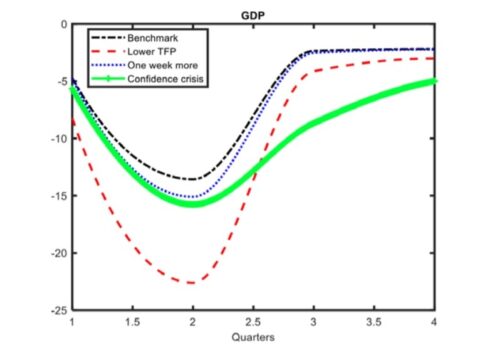The ECO 2020 Report focuses on making a first approximation to the macroeconomic impact in Spain caused by the COVID-19 epidemic.

Rather than providing growth forecasts, the approach they take is to José E. Boscá, Rafael Doménech y Javier Ferri consists of simulations conditional on a set of assumptions, about which they are very transparent. These simulations are obtained from the latest version of the EREMS dynamic stochastic general equilibrium model (see Boscá et al, 2018). The simulation approach with EREMS is similar to that used in other recent research that has started to assess the effects of this crisis (e.g, Eichenbaum, Rebelo and Trabandtz, 2020, o Faria e Castro, 2020). The functioning of this model is determined by a set of equations, variables and parameters that describe the aggregate functioning of the Spanish economy. Most of these variables are endogenous in the model. When the economy receives shocks, such as those originated by the coronavirus, the response of these endogenous variables provides a picture of the dynamics of the main macroeconomic aggregates following these shocks.

The assumptions underlying these simulations of the impact of the crisis are based on the principle of prudence and can therefore be considered relatively optimistic. In any case, as an element of comparison, the results of another less optimistic but relatively plausible scenario are also provided at the end of the report. Only as real-time data on the evolution of employment and activity become available in the coming weeks and months will we be in a position to assess the extent to which this available information allows us to distinguish one scenario from another.


